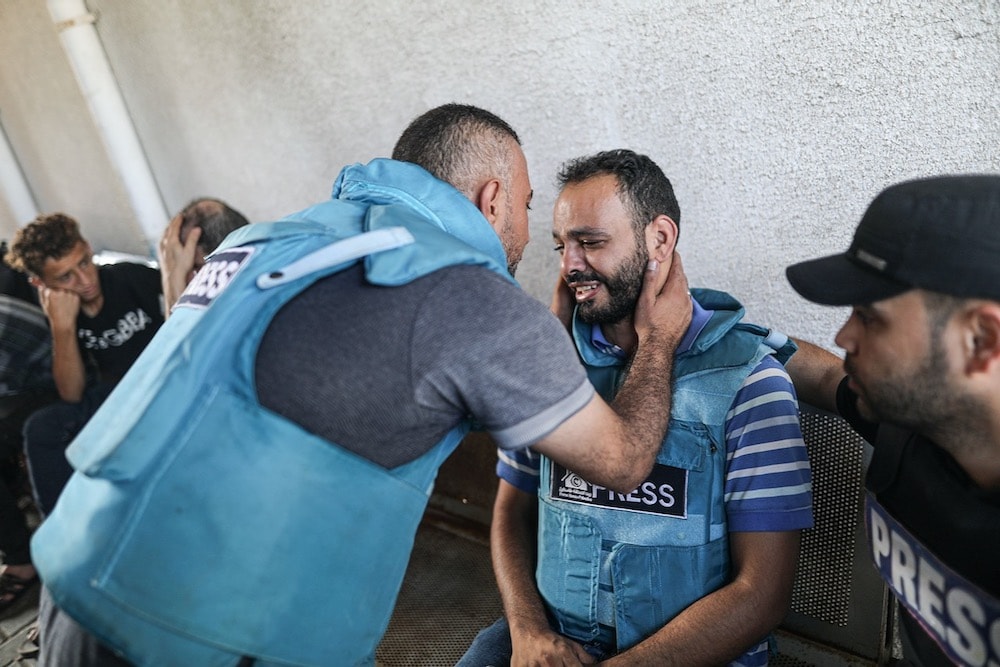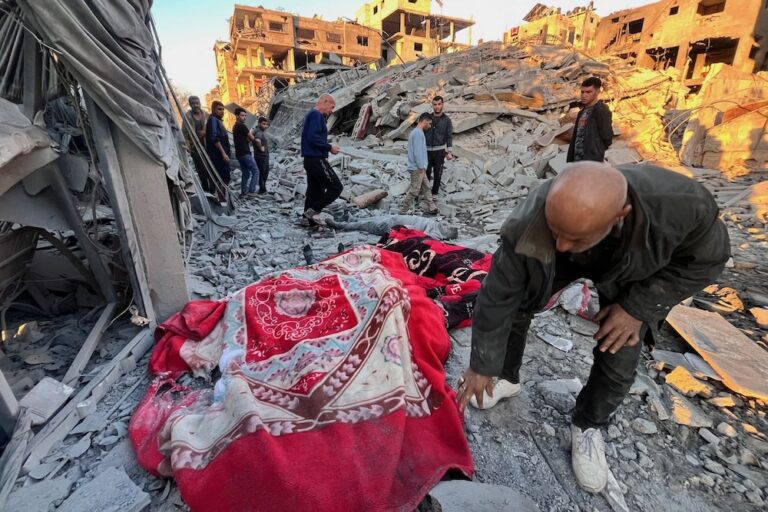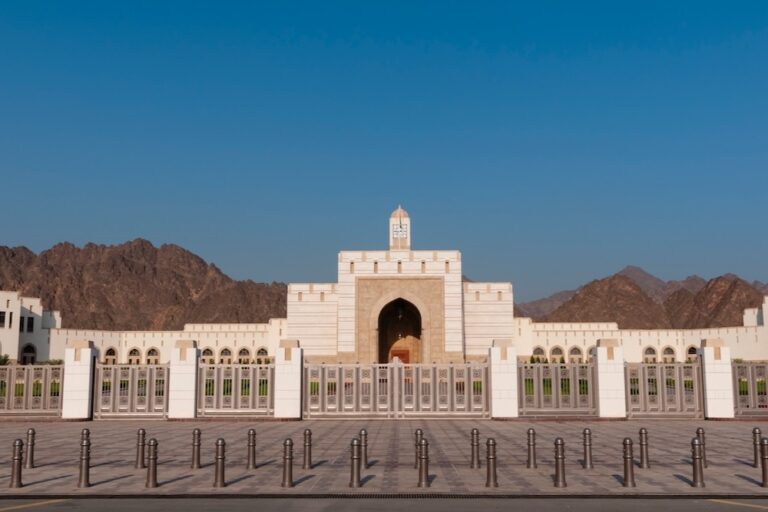We share responses of IFEX member organisations to the violence in Palestine and Israel, as journalists and media crews try to stay alive as they report, and misleading and weaponised disinformation distorts narratives, further fuelling the conflict.
IFEX members urgently demand an immediate end to the bloodshed, and underscore the pressing need to ensure access to credible, timely information, while protecting voices reporting on the ground and online.
Safety and justice: The ‘deadliest time for journalists’
At the time of writing, since the 7 October violence began at least 25 journalists have been killed, including 21 Palestinians, 3 Israelis and 1 Lebanese journalist, with the death toll continuing to rise. Relying on reporting from multiple sources in the region, including IFEX member the Palestinian Centre for Development of Media Freedoms (MADA), the Committee to Protect Journalists (CPJ) maintains a growing list of investigated reports of journalists killed, injured, or detained.
The growing tally brings into sharp focus the increasingly deadly conditions faced by journalists and civil society workers reporting on the ground.
Denouncing Israel’s systematic campaign against civilians and journalists in Gaza and the West Bank and calling for international intervention to put an end to the blatant aggression, MADA emphasised that these violations serve only to stifle voices exposing injustices perpetrated by Israel on Palestinians.
“In light of the extremely dangerous situation in which our people in the Gaza Strip are living, and in light of all the previous attacks targeting media freedoms in the West Bank and the Gaza Strip, MADA Center emphasises that all these violations carried out by the occupation authorities with the aim of silencing the voices of truth, are under false pretexts and will not dissuade journalists and media institutions to continue their message.”
Rights groups have called for the protection of journalists reporting from the frontlines and demanded investigations into their killings. While covering aggressions at the Israeli-Lebanese border between Israel and Hezbollah, the killing of Reuters photojournalist Issam Abdallah during an Israeli airstrike on 13 October has underscored the immediate necessity for accountability amid growing fears over the conflict’s regional spillover.
The Gulf Centre for Human Rights and the International Press Institute (IPI) joined Reuters in calling on the Israeli military to carry out a thorough, credible, and transparent investigation into Issam’s killing. Highlighting Israel’s poor track record in holding perpetrators accountable for crimes against journalists, including the killing of Palestinian-American journalist Shireen Abu Akleh, IPI urged international partners to put real pressure on Israeli authorities to conduct an effective investigation that results in consequences for those responsible.
“Israel – and all parties to the violence – must respect and protect the safety of journalists covering the ongoing events in the region. International law makes clear that journalists are considered civilians in situations of war and armed conflict. Journalists are never legitimate targets and any deliberate targeting of the press would amount to a war crime.” — IPI Executive Director Frane Maroević
I’lam Center also condemned the attacks on journalists and extended safety guidance and support to those facing violations while reporting in the field.
With the civilian death toll continuing to climb unhindered, IFEX members have called on the international community to demand an end to the bloodshed and an immediate ceasefire.
The Cairo Institute of Human Rights Studies (CIHRS) and 47 human rights groups from the region condemned attacks by both parties, and the international and Arab failure to “prevent a war of annihilation” against Palestinians. In a statement addressed to the United Nations Security Council and members of the League of Arab States, they write:
“The international community should examine in-depth the causes of the outbreak of violence and its recurrence, and it must also change course on the decades-long international failure to prevent Israel’s repeated and escalating violations of international resolutions and agreements while defending the rights of the Palestinians to self-determination and return.”
Dozens of journalists reporting in the Gaza Strip have had to flee their homes due to continued Israeli bombardment. In the course of this forced displacement, many journalists have also been compelled to abandon their equipment, documents and protective gear crucial for their work, according to Reporters Without Borders (RSF).
One of RSF’s correspondents relayed her dire situation after enduring several hours without a network connection on 14 October, just a week into the conflict. “I evacuated my home in Gaza City last night,” she informed RSF:
“I’m having trouble talking to you. We barely have any internet here and we can’t charge our phones. I am doing my best to gather information. We live in fear, it’s unbearable. This is not the first war I’ve covered in Gaza, but I have never seen anything like this.”
Palestinian photojournalist Roshdi Sarraj lamented the lack of media coverage from Gaza in one of his last tweets before being killed by an Israeli airstrike.
‘They are cut off from the world’: Censoring Palestinian voices and shutting down media
Drawing attention to the systematic silencing of pro-Palestinian voices, PEN International noted that “reports of attempts by mainstream media outlets to suppress journalistic coverage of Israel’s extensive ongoing bombing of Gaza, including distortion of its own reporting, are of particular concern.”
The group pointed to a number of cases of journalists, artists and authors facing reprisals for expressing solidarity with Gaza or criticising Israeli actions. They range from the BBC’s decision to take six reporters off the air and launch investigations into their social media posts, to the postponement of an award ceremony for Palestinian writer Adania Shibli at the Frankfurt Book Fair.
Media outlets covering events on-the-ground are facing increased targeting by Israeli authorities. Rights groups denounced moves by Israel’s communications minister to shut down Al Jazeera network’s local bureau.
“We are deeply concerned by Israeli officials’ threats to censor media coverage of the ongoing Israel-Gaza conflict, using vague accusations of harming national morale. CPJ urges Israel not to ban Al Jazeera and to allow journalists to do their jobs. A plurality of media voices is essential in order to hold power to account, especially in times of war,” said Sherif Mansour, CPJ’s MENA program coordinator.
Israeli authorities also issued an order to shut down Palestinian media outlet J-Media, with MADA calling the decision “extremely dangerous” as it comes amidst fierce attacks on Palestinian content and media outlets.
IFEX joined the MENA Alliance for Digital Rights and other civil society organisations in condemning Israel’s targeting and destruction of telecommunications infrastructure in Gaza, which is preventing Palestinians from accessing life-saving information and recording human rights violations. In a statement demanding an immediate ceasefire, rights groups called for the urgent restoration of electricity and internet connectivity in Gaza, as well as an end to the targeting of civilian telecommunications infrastructure.
“Without electricity, the internet, or basic Information and communication technology (ICT) services, people in Gaza cannot access life-saving information about which areas are under attack or where they can find medical supplies and aid, nor can they connect with families and loved ones. They are cut off from the world.”
Between power disruptions and the restriction of communication channels, WAN-IFRA reported a sense of mounting despair and frustration that journalists are being prevented from doing their jobs as this crisis unfolds. “The dangerous situation has severely hindered their ability to report on the unfolding events,” confirmed Shuruq As’ad, WAN-IFRA Women in News’ country coordinator for Palestine, who is in Gaza.
Narrative battles and disinformation’s real-world impact
While journalists struggle to report safely from the frontlines, Palestinian online voices are facing an onslaught of attacks on multiple fronts. This includes an increasingly polluted information ecosystem, rife with disinformation, designed to support competing narratives. Digital censorship in the form of account takedowns, shadowbans, and doxxing, as well as a staggering rise in hate speech are also contributing to real-world harms.
In the first five days of the conflict, The Arab Center for the Advancement of Social Media (7amleh) documented over 19,000 instances of online hate speech and incitement targeting Palestinian voices. By 18 October that number had risen to 103,000 out of a total of 120,000 posts collected on its violence indicator. The AI-powered Language Model monitors the spread of hate speech and violence in Hebrew against Palestinians and their advocates on social media platforms in real-time.
7amleh has used this data to support efforts to pressure social media platforms to remove inciting speech:
“These tweets, classified as hate speech and incitement, can potentially translate into real-world attacks on Palestinians, as previously seen with incitement on the same platform, leading to organised attacks by Israeli settlers on Palestinian communities both in the West Bank and Israel, There is concern that similar attacks may occur again.” — 7amleh General Director, Nadim Nashif
The unchecked circulation of hate speech in online spaces drowning in a flood of disinformation has already led to severe real-world repercussions in the form of a spike in hate-fuelled incidents targeting Palestinian and Jewish communities globally. This includes the murder of a six-year old Palestinian-American boy in Illinois in an Islamophobic attack that also left his mother seriously wounded, as well as the antisemitic burning and destruction of Al-Hamma synagogue in Tunisia by pro-Palestinian protesters.
X has emerged as one of the biggest platforms hosting disinformation about the conflict. According to an article by lecturer and researcher Sophie Fullerton, published by Index on Censorship, “X marks the spot where Israel-Hamas disinformation wars are being fought”, a series of algorithmic and “aesthetic” changes since Elon Musk’s acquisition of the company has eroded its content’s credibility, having a profound impact on how facts are represented in the battle of narratives.
“Instead of boosting posts from experts and on-the-ground reporting, X’s algorithm promotes Twitter Blue subscriptions, accounts which pay for a verification checkmark. This ‘pay to play’ method has served to boost accounts of bots and propagandists, and has enabled disinformation to go viral in a short amount of time.”
IFEX joined civil society organisations calling on tech companies to respect Palestinian digital rights during this crisis, and urgently address instances of online hate speech and violent discourse targeting Palestinians:
“Incitement to violence against Palestinians and calls for collective punishment are spreading rampantly across online platforms, especially on X and Telegram. Human rights abuses and calls for attacks are oftentimes encouraged by high-ranking Israeli officials. This incitement transcends the virtual realm and has fatal consequences.”
The Digital Investigations Lab at Human Rights Watch has been working with on-the-ground researchers to verify information, analysing hundreds of videos to identify misinformation. The visual evidence supports ongoing efforts to document unfolding abuses including possible war crimes.
Finally, Access Now and Social Media Exchange (SMEX) compiled a digital resilience tipsheet designed to support human rights defenders, journalists, activists, and others facing repressive tactics both in person and online in defending against reported threats – including disinformation, censorship, online harassment, doxxing, and shadowbanning.
As the situation continues to escalate, we encourage you to follow these and other civil society organisations for credible, timely reporting on the situation.



